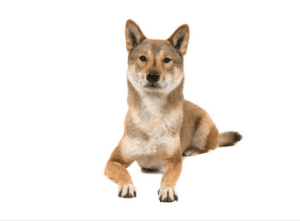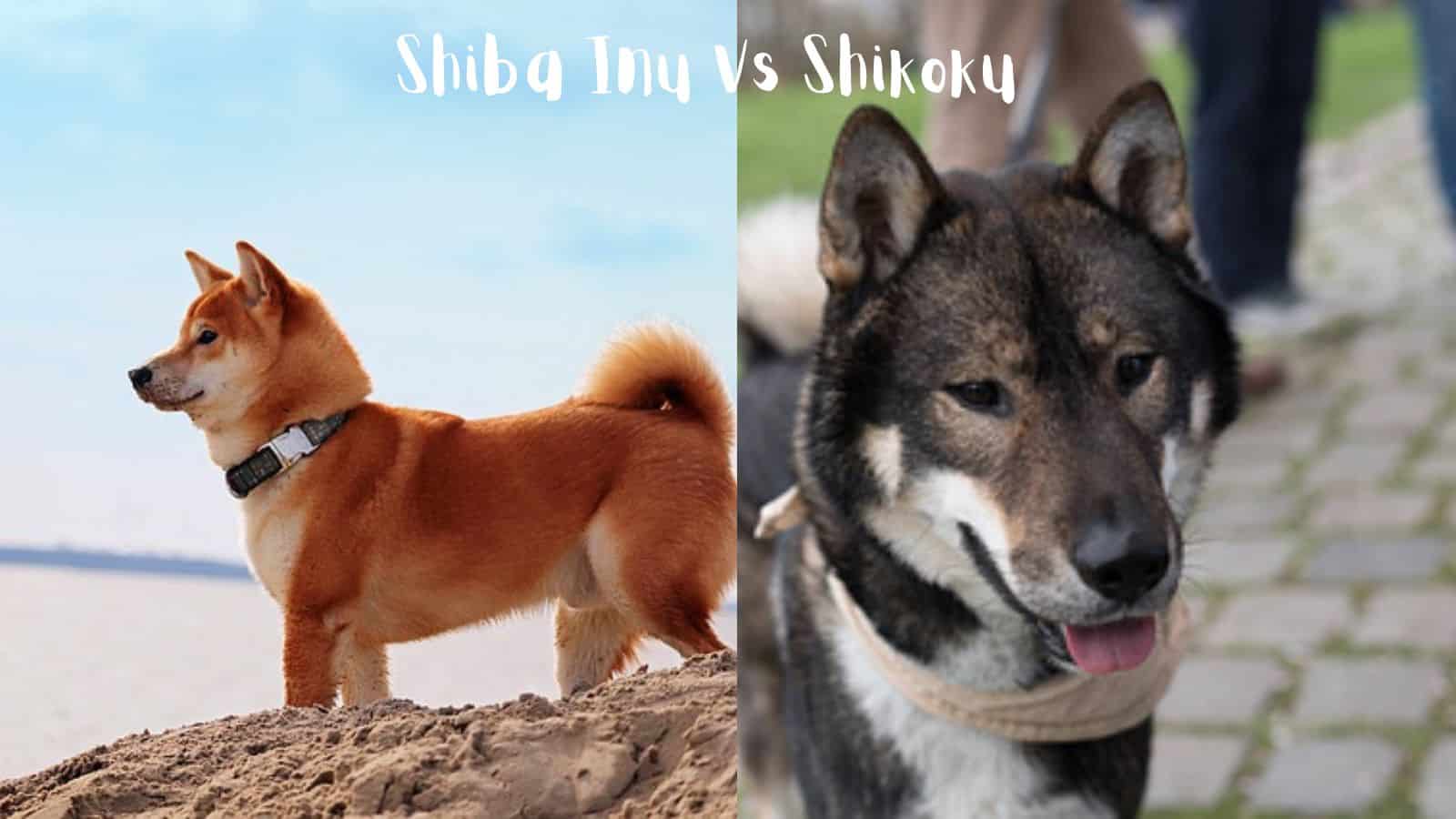Best Smart Shiba is an Amazon Associate. We earn a small commission from qualifying purchases. For more information, visit my privacy policy page.
Shikoku dog Vs Shiba Inu is an interesting comparison between two amazing breeds with wonderful personalities.
Although both breeds originated from Japan, there are of different sizes and have different care and maintenance needs.
Both breeds were purposely bred for hunting small game; however, Shikoku was also used in search missions.
While Shiba Inus have recently gained a lot of fame worldwide, Shikoku remains a scarce breed of dog that’s hardly known outside Japan.
This Shiba Inu Vs Shikoku breed comparison article compares the two breeds based on different aspects such as personality, appearance, exercise, and maintenance needs. Stay tuned.
Table of Contents
Shikoku Dog Vs Shiba Inu Chart Comparison
| Shiba Inu | Shikoku Dog | |
| Size in height | 13 to 17 inches | 18 to 24 inches |
| Weight | 15 to 25 pounds | 45 to 65 pounds |
| Lifespan | 11 to 15 years | 13 to 16 years |
| Grouping | Companion dog | Companion dog |
| Coat Type | Double coat | Double coat |
| Temperament | Affectionate, Alert & Loyal | Affectionate, Alert & Curios |
| Shedding | Heavy Shedding | Moderate Shedding |
The numbers above shouldn’t necessarily be accurate but provide an average estimation. The numbers might differ from one canine to another.
Shiba Inu Breed Overview
There’s no doubt that Shiba Inus are among the most popular breeds of Japanese origin currently. Shibas have gained massive fame with the emergence of the Shiba Inu coin.

Shibas aren’t only famous in Japan and other parts of the world like the United States. Many people are becoming more obsessed with the breed as the years go by.
Shiba Inus are unique in their ways. For example, this breed has some funny ways of communicating with their owner, which often involves the “Shiba Scream”.
The Shiba Inu scream is a vocalized shriek produced by Shibas when they’re overly excited or feel threatened.
In addition, Shiba Inus have an alert and active temperament. Although they’re categorized under small dogs, Shibas aren’t your typical small dog.
Further, Shibas aren’t the type of dog that spends the entire day cuddling on your lap. They’re independent and often want to spend some time by themselves.
Generally, Shiba Inus are free-spirited and love to think by themselves and do what they think is right. They even ignore their owner when not in the mood.
Shiba Inus are naturally independent. Therefore, expect your Shiba Inus to show stubborn streaks now and then. While they’re independent, Shibas are so affectionate and loyal.
In addition, Shiba Inus are extra vigilant with their immediate surrounding. This breed is always watchful and cautious of any strangers.
Although they don’t have the perfect body to offer protection, Shibas will alert you in case of any stranger or person they don’t know.
Shikoku Dog Breed Overview
The Shikoku dog breed originated from Shikoku Island in Japan. Shikoku looks very much like Shiba Inus.
Shikoku was bred for hunting boar and deer in the mountainous regions of Shikoku Island. Other names used to identify Shikokus include Kochi-ken, board hound, or Kishu dog.

This breed has become rare in recent years despite being considered one of the purest Japanese native dogs, also known as Nihoken.
Due to the unfavourable topography in the mountain regions, Shikokus are pure due to remaining isolated from other breeds for interbreeding.
There were originally two lines of purebred Shikoku breed, the Western and Eastern Shikoku. Western Shikoku was known as Mount Ishizuchi, while Eastern Shikoku was known as Mount Tsurugi Shikoku.
The two lines of Shikoku were inbred together in the 1950s, giving one specific Shikoku breed. The result was a primitive dog, a good watch dog and pretty reserved with strangers.
Shikoku Dog Vs Shiba Inu Size
Shiba Inus have a shoulder height of average between 13 to 17 inches, whereas Shikoku dogs have a shoulder height ranging averaging between 18 and 24 inches.
This shows that Shikokus are slightly taller than Shiba Inus. They’re taller than Shiba Inus and weigh more than Shibas.
Regarding weight, Shikokus weigh between 45 and 65 pounds, while Shiba Inus average between 15 and 25 pounds.
Although these numbers do not necessarily represent all dogs in the two breeds, they represent an average population.
Besides, estimation averages can act as a tool to help you visualize the expectations to have with your canine friend during the growing stages.
Shikoku Dog Vs Shiba Inu Lifespan
Shiba Inus and Shikoku dogs have almost the same lifespan since they average between 11 and 15 years.
Nevertheless, this doesn’t rule out exceptional cases. There are instances where you may find a dog of either breed doing up to 20 years; however, these cases are pretty rare.
Providing high-quality food is the key to giving your canine friend a longer lifespan. Also, ensure frequent health checkups to identify body complications early enough.
A number of chronic conditions can be managed if they’re diagnosed early enough.
The quality of care is a crucial determinant of canine longevity; however, other factors include the dog’s breed.
Although they have a somewhat similar lifespan, Shiba Inus are likely to live longer than Shikokus because they often have a lifespan between 13 and 17 years.
On the other hand, most Shikokus will have a lifespan of between 11 to 14 years of age. This is the average lifespan considering the high quality of care provided.
Shiba Inu Vs Shikoku Temperament
Every breed has its temperament, which should not be generalized based on other experiences. Besides, many factors influence canine behavior.
In Need of a Perfect Family Dog?
Thankfully, both Shikoku and Shiba Inu make good companions and house dogs; however, I’d argue that Shikokus are perfect family dogs more than Shibas due to their friendliness.
Both breeds have outgoing personalities. The high prey drive in both breeds can be challenging if your family isn’t active. They have a high prey drive which needs a careful and firm handler.
In addition, both breeds are affectionate to family members. Shikoku will even have a favorite family member they protect full-time and are fiercely loyal to.
Also, when it comes to behavior around kids, there’s no significant difference between both breeds.
Although they don’t top the list of kid-friendly dogs, it doesn’t necessarily mean that these breeds will not tolerate kids around them.
Although both breeds are good with kids, they need more time to familiarize themselves, socialize, and get used to them.
Guarding Behavior
Since both breeds are loyal to their owners, they have dog-guarding behavior. Shikoku are more guards than Shiba Inus, though.
While Shiba Inus have some guarding behavior, with proper training and socialization, they learn to coexist well with family members.
Shikoku are better with other dogs than Shiba Inus. Generally, both breeds aren’t that good with other dogs unless they’re well-socialized and have undergone obedience training.
When it comes to strangers, Shikokus are weary of strangers but are quick to learn what position that stranger holds. In addition, they warm up to strangers quickly based on your reaction.
Shiba Inu Vs Shikoku Dog Adaptability
- Adaptability To Apartment Living
- Adaptability To Hot Weather
- Adaptability To Cold Weather
What’s more;
Adaptability to Apartment Living
While not all dogs are suitable for apartment living, some dog breeds do perfectly.
Some of the key reasons that prevent dogs from being good apartment dogs are associated with size, noise, shedding level, energy level, and smell.
Both Shikoku and Shiba Inus are considered good apartment living. They are silent and hardly bark unless there’s a reason to do so.
However, they’re both double-coated. That means you expect moderate shedding throughout the year and heavy shedding twice a year.
You’ll need to prepare for the shedding seasons with a shedding brush and vacuum cleaner.
Adaptability To Hot Weather
Depending on your region’s climate, you may want to consider a dog that adapts fairly well to the respective climate.
Hot weather may not be the best for double-coated dogs. While Shiba Inus can adapt slightly to hot weather, Shikoku aren’t the best with hot weather as they have a lot of fur.

Shiba Inus have better chances of adapting to hot weather compared to Shikoku. Therefore, when the warm weather comes, schedule the exercise early morning or in the evening.
Avoid pavements. Remember, it’s too hot for paws if you can feel the warmth on the pavement or ground with your hand.
Adaptability To Cold Weather
Cold weathers and temperatures are the best for these two breeds. They support cold temperatures falling even below 200 F.
Thankfully, the double coat works best to help maintain average body temperature. Extreme winters aren’t a big issue for Shiba Inus and Shikoku dogs.
Since they both tolerate cold weather, you don’t have to worry about cold-associated problems like hypothermia and frostbite.
Shiba Inu Vs Shikoku Trainability
Obedience training plays a crucial role in your dog’s life. While some canines are easier to train, others are somewhat challenging.
These two breeds are intelligent and thus quickly grasp commands. Therefore, you need to train them.
Shikokus are easier to train than Shiba Inus. They like to please their owners and are fiercely loyal.
However, these two breeds aren’t easy to train for first-time owners. They’re usually stubborn, independent, and strong-willed.
However, experienced owners don’t have a hard time training Shikoku and Shiba Inus. However, Shikoku is better at grasping and obeying commands.
If you select any of these two breeds, you should always have these three dog training pillars: patience, persistence, and consistency.
If you don’t have enough time for training, you may hire the services of a professional trainer. Remember, your canine friend should be trained in your presence as it increases the chances of success.

